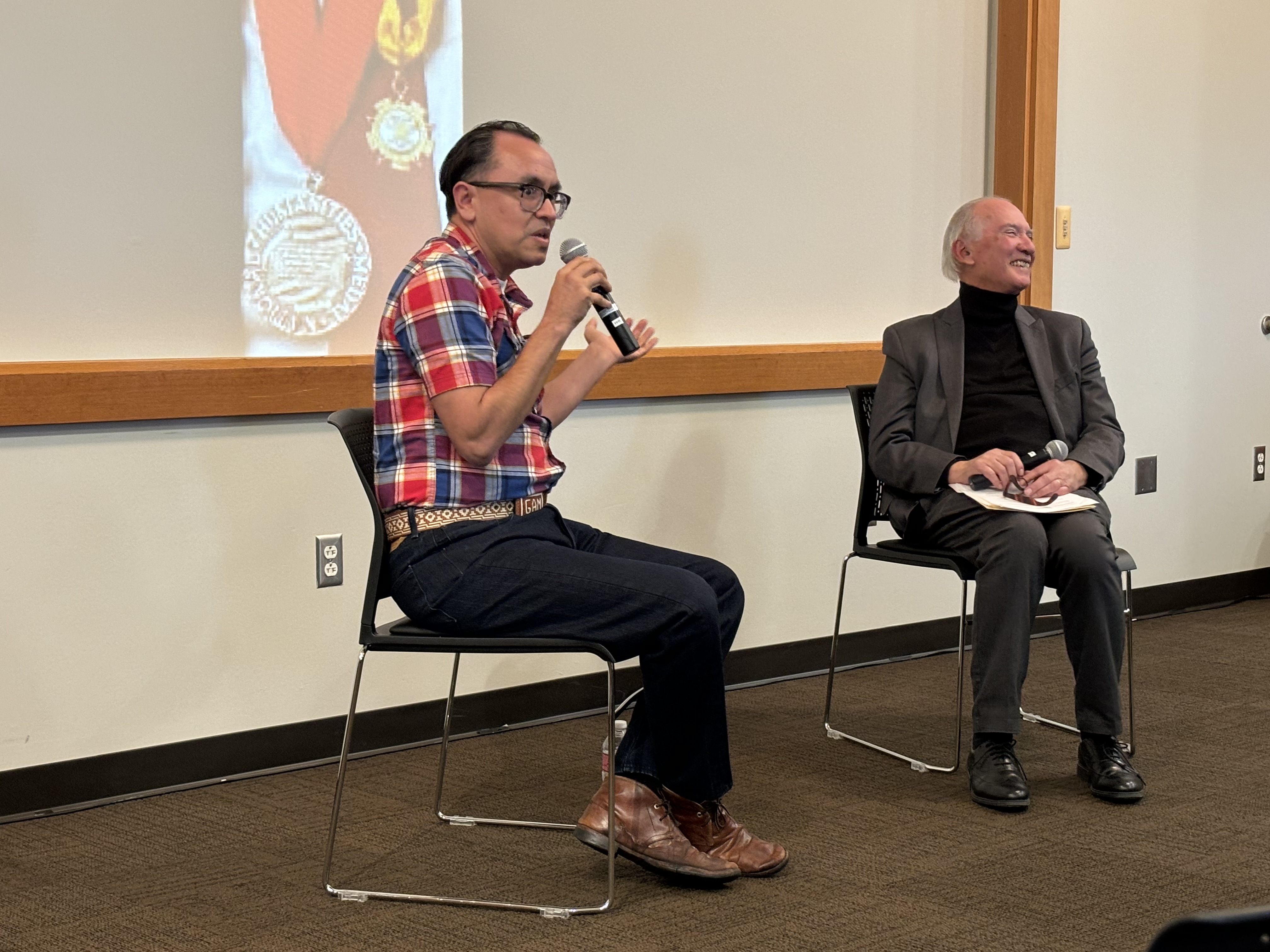Gustavo Arellano Honored for Distinction in Chicano Literature at UC Santa Barbara
Journalist Receives Luis Leal Award for a Career Highlighting Latino Culture in California

Gustavo Arellano — longtime reporter, columnist, and food writer who has used his pen to explore the deeply beautiful and conflicted history of Mexican-American culture in California — visited UC Santa Barbara on Wednesday, February 7, to accept the Luis Leal Award for Distinction in Chicano/Latino Literature. The Los Angeles Times journalist was celebrated for his career-long dedication to covering the Latino community on a wide scale.
“I can’t overemphasize how humbled I am to win this award,” Arellano said. “The previous recipients are scholars, playwrights, poets, essayists, thinkers. I’m just a Mexican with glasses from Orange County in the dying trade of journalism. To be with literary Latino greats at least lets me know someone has read some of my work!”
The award was named after the late Luis Leal, or “Don Luis” as he was known, who helped establish the nation’s first-ever doctoral program in Chicano studies during his time at UCSB. Leal died in 2010 at the age of 102, but in his time in academics he changed the way scholars treated Chicano literature, putting the work of Latino authors and writers right alongside the greats of classic literature.
UCSB Chicano Studies professor Mario T. García, who worked alongside Leal to create the award 19 years ago, said that Arellano’s work — both at the O.C. Weekly and the L.A. Times — has continued Leal’s legacy by giving the art of column writing the same weight as literary essays and novels.
García described the “great humor and biting criticism” of Arellano’s writing, which evolved through his nationally syndicated column “¡Ask a Mexican!” and was perfected through his reporting, which took him across the country on a mission to explore the hearts and minds of people through food and community. García interviewed Arellano in a packed lecture hall at UCSB after presenting the award on Wednesday afternoon.
“Journalism has been rewarding for me because I’ve always been curious about what makes society tick,” Arellano said to the room full of students and attendees who had squeezed into the sixth-floor McCune Conference Room.
Arellano, who was both full of energy and sharply funny, said his love for the written word can be traced back to his parents, Lorenzo and Maria de la Luz, who instilled in him a love for reading despite having their own educations cut short at a young age.

In his hometown of Anaheim in Orange County, he was confronted with the dichotomy of a region that had a large Latino population but also got a reputation for the conservative-leaning political views of some of its residents. His “¡Ask a Mexican!” column started as a “satirical response to white supremacists,” he said, but soon it became a forum to educate uninformed readers about Latino culture.
“Since Orange County is so clueless about Mexicans, we made an advice column,” he joked.
Soon, his column became wildly popular — both criticized for reinforcing Latino stereotypes and celebrated for bringing genuine conversations about culture to the forefront — and what made it work, he says, is his ability to use his biting humor to “punch up,” while also allowing him to play the fool, or “pendejo,” in other situations.
At the Los Angeles Times, Arellano explored food, culture, and society, using his column as a spotlight to lift up those who were doing great things in their communities while also shedding light on those who worked in the shadows by going after corrupt politicians. He was especially critical of Latino politicians who seemed to turn against their own communities after earning positions of power.
“All politicians are tempted by corruption, and some fall into it. Latino politicians should be held to a higher standard” Arellano said. He said that his criticism of Latino politicians has earned him some pushback, but that he “sheds no tears for them.”
“I will be harder on them because they should know better,” he said.
Arellano said that his journalistic compass came down to one defining rule: “Do good things and I’ll write good things about you. Do bad things … then watch out.”
But despite his quick-witted criticism of politics, Arellano is still hopeful about the future of the country — as long as the next generation can rid itself of voter apathy, which he said was “the worst thing to happen to American democracy.”
“It’s shameful — more disgusting than Trump could ever attempt to be,” he said.
Arellano closed the event by fielding questions about his food writing, which he said he stumbled into by mistake once when an editor asked him to do a restaurant review. “My whole career has been an accident. A career of opportunities I was smart enough to take,” he said.
He encouraged others to explore their communities and to learn the backstories that make each neighborhood and city uniquely special. “Tell your own stories, because if you don’t, who will?”
Arellano’s work can be found in the Los Angeles Times and the culinary quarterly Gravy (published by the University of Mississippi); he also has written three books published by Scribner — “¡Ask a Mexican!” (2007); “Orange County: A Personal History” (2008), and “Taco USA: How Mexican Food Conquered America” (2012) — and co-authored “A People’s Guide to Orange County” (University of California Press, 2022).

You must be logged in to post a comment.